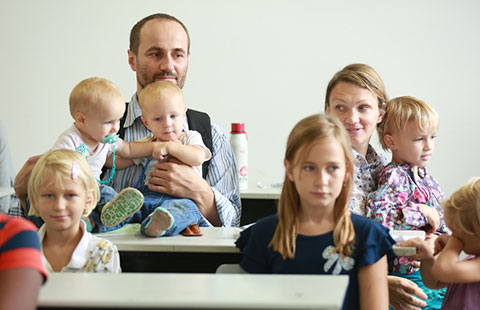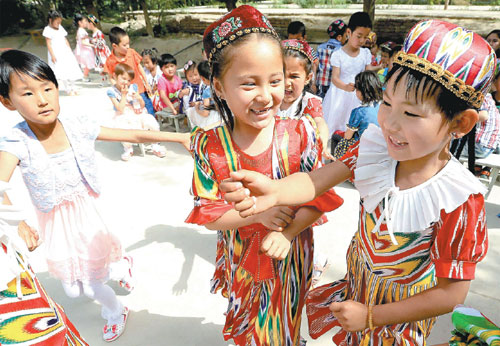Free kindergartens offer vital lessons in ethnic unity
Updated: 2015-09-30 08:26
By Luo Wangshu(China Daily)
|
||||||||
|
Children from Han and other ethnic groups in a kindergarten in Hami, the Xinjiang Uygur autonomous region, play together in May last year. Children from all ethnic groups mingle in the same classes in the kindergarten, helping them to better understand each other's language and culture. Cai Zengle / for China Daily |
Uygur mother Zoregul Memet is grateful her child Ayitla Memet is able to attend kindergarten for free and learn to speak Mandarin.
"My daughter rarely spoke Mandarin before she entered kindergarten. But since she started, I've seen her change every day. Now she is able to speak fluent Mandarin, sing many folk songs and tell stories," the mother said.
Thanks to the abolition of kindergarten fees in 2008 in Ruoqiang county, Xinjiang Uygur autonomous region, children from all ethnic groups can get a head start.
Chen Hui, deputy headmaster of the county's Hebei kindergarten, explained that children from all ethnic groups mingle in the same classes, and that children from the Han ethnic group also have the chance to learn the Uygur language.
This allows the children to better understand the language and cultures of the other ethnic groups they live alongside, he said.
Zoregul Memet said that the policy has taken a great deal of pressure off her family as, before starting kindergarten, Memet's daughter had nowhere to learn the language.
"Grandparents took care of her, and the elderly are not able to teach her Mandarin. My husband and I were busy with work and did not teach her either," she said.
Li Ying, deputy director of the Ruoqiang Education Bureau, said: "The free policy has reduced the financial burden on herdsmen and farmers, allowing their children to attend kindergarten and further realize education fairness."
Since the policy went into effect, 97 percent of children aged 3 to 5 and 99 percent of children aged 4 and 5 have attended kindergarten.
The county has invested 24 million yuan ($3.8 million) to establish and renovate kindergarten facilities since 2008, she said.
Ruoqiang was home to the ancient Kingdom of Charklik and well-known Lop Lake. It covers an area of 198,318 square kilometers, about the same size of Kyrgyzstan, making Ruoqiang the largest county-level division in China. It has a population of 56,000, of which 41.73 percent are from ethnic groups.
Ruoqiang has seven kindergartens that teach 1,643 children. In September, 453 children entered the program, with 235 of those from non-Han ethnic groups.
The next move for Ruoqiang's early childhood education is to improve quality.
Capital Normal University in Beijing is helping the county improve.
"Ruoqiang has already popularized early childhood education and started to focus on quality," said Xia Jing, assistant professor of early childhood education at Capital Normal University, adding that she and her colleagues are writing plans for Ruoqiang's education development after field studies.
Ruoqiang is an example of improving childhood development through providing free early education to local residents. Some other regions such as the Tibet autonomous region have also provided free programs to locals.
Top authorities have encouraged developing early childhood education in China in recent years. A recent meeting of the Standing Committee of the National People's Congress discussed drafting early childhood education into law.
The draft amendment to the education law proposed that the State draw up an early childhood education standard and accelerate its implementation, especially in rural areas.
luowangshu@chinadaily.com.cn
- Senior US envoy to visit Japan, S Korea, China
- Russia, US agree to cooperate in solving Syria crisis: Russian FM
- Iranian President calls Iran deal victory over war
- LatAm experts praise Xi on yuan, globalization
- Evidence found of summertime water flows on Mars: study
- Dogs surf in contest in California

 Ten highlights from Xi's trip to US and UN
Ten highlights from Xi's trip to US and UN
 Top 10 life-changing benefits from Xi's US visit
Top 10 life-changing benefits from Xi's US visit-
 Highlights of President Xi's speeches at UN
Highlights of President Xi's speeches at UN -
 The president's historic journey to the west
The president's historic journey to the west -
 China's first lady visits Juilliard School
China's first lady visits Juilliard School 
 Polish couple brings six daughters to China to study Chinese
Polish couple brings six daughters to China to study Chinese
 Top 10 nominated designs at Beijing Design Week
Top 10 nominated designs at Beijing Design Week-
 China gifts the UN 'Zun of Peace' for 70th anniversary
China gifts the UN 'Zun of Peace' for 70th anniversary
Most Viewed
Editor's Picks

|

|

|

|

|

|
Today's Top News
Xi pledges $2 billion to help developing countries
Young people from US look forward to Xi's state visit: Survey
US to accept more refugees than planned
Li calls on State-owned firms to tap more global markets
Apple's iOS App Store suffers first major attack
Japan enacts new security laws to overturn postwar pacifism
Court catalogs schools' violent crimes
'Beauty of Beijing's alleys akin to a wise, old person'
US Weekly

|

|








